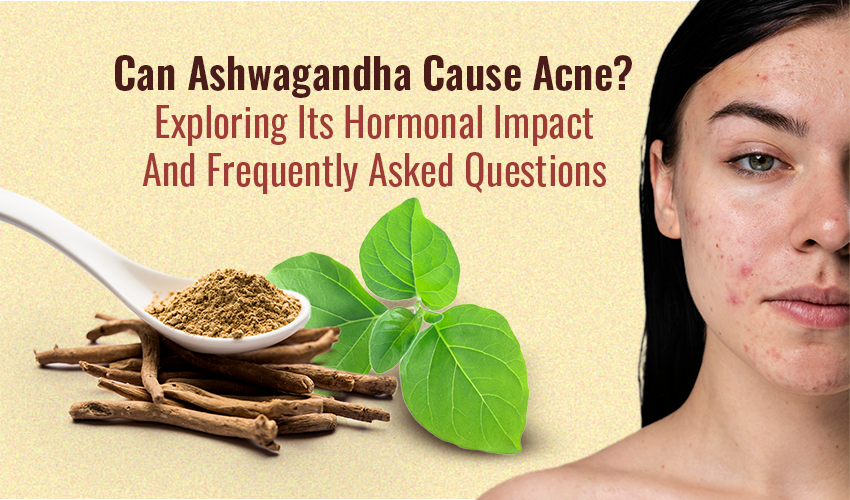Ashwagandha, scientifically known as Withania somnifera, is a popular herb in traditional Ayurvedic medicine. It is renowned for its adaptogenic properties, meaning it may help the body adapt to stress and promote overall wellness and healing.
Ashwagandha is sourced from the root of the Withania somnifera plant and has been used for centuries in various cultures for its potential health benefits.
Can Ashwagandha Cause Acne?
There is a possibility that the Ashwagandha herb may cause acne skin problems in some individuals. While its use is generally safe for most people, some might experience adverse reactions and skin issues, including acne, which has been reported as a potential side effect.Ashwagandha and Hormonal Acne
Ashwagandha herb’s impact on hormonal balance is a key factor in its ability to cause acne. It interacts with different hormones within the body, such as thyroid and testosterone, which have an influence on skin health.Affects Testosterone Levels
Ashwagandha has been indicated to affect testosterone levels. Increased testosterone levels, especially in women, can contribute to hormonal imbalances and potentially lead to acne breakouts.Thyroid Hormones
Ashwagandha is also known to influence thyroid hormones. Thyroid imbalances can impact skin health, and disruptions in thyroid function may contribute to acne development.Some common uses of Ashwagandha in Traditional Medicine:
In traditional medicine, Ashwagandha has been employed to serve a variety of purposes, including –
- Stress reduction: Ashwagandha is known for its adaptogenic properties, which means it helps the body adapt to and manage stress. It has been traditionally used to reduce stress and anxiety by regulating the body’s physiological responses to stressors. The herb is believed to act on the adrenal glands, helping to balance stress hormones like cortisol. Discover the role of stress in acne breakouts.
- Immune support system: Ashwagandha is believed to possess immunomodulatory properties, which means it may help regulate and support the immune system. It is thought to stimulate the production of white blood cells and enhance the activity of immune cells, contributing to the body’s defense against infections and illnesses.
- Improved energy levels: Traditionally, Ashwagandha has been used as a rejuvenating herb to enhance vitality and energy levels. It is believed to nourish the tissues, improve overall strength, and combat fatigue. By supporting the adrenal glands, Ashwagandha may also help in maintaining sustainable energy throughout the day.
- Boosting cognitive function and abilities: Ashwagandha is considered a nootropic herb, which means it may have cognitive-enhancing effects. It is thought to support brain function by reducing oxidative stress and inflammation. Some traditional uses include enhancing memory, improving concentration, and promoting overall mental clarity.
Benefits of Ashwagandha
- Anxiety and Depression: Some studies suggest that ashwagandha may have anxiolytic (anxiety-reducing) and antidepressant effects, potentially improving mood and emotional well-being.
- Cognitive Function: There is evidence to suggest that ashwagandha may support cognitive function and memory. It is believed to have neuroprotective properties that could benefit brain health.
- Anti-Inflammatory Properties: Ashwagandha contains compounds with anti-inflammatory effects, which may help reduce inflammation in the body. Chronic inflammation is associated with various health issues.
- Immune System Support: Some studies indicate that ashwagandha may have immunomodulatory effects, helping to regulate the immune system and potentially enhancing its function.
- Energy and Stamina: Ashwagandha is believed to have revitalizing properties, and some individuals report increased energy levels and improved stamina after regular use.
Side Effects:
Apart from the possibility of acne, some other side effects of Ashwagandha usage may include:
- Gastrointestinal Issues: Some people may experience gastrointestinal upset, including stomach discomfort, diarrhea, or nausea.
- Allergic Reactions: Although rare, some individuals may be allergic to ashwagandha and could experience symptoms such as itching, rash, or difficulty breathing.
- Interactions with Medications: Ashwagandha may interact with certain medications, particularly those that affect the central nervous system or have sedative effects. It’s advisable to consult with a healthcare professional if you are taking medications.
- Blood Sugar Levels: There is some evidence to suggest that ashwagandha may lower blood sugar levels. Individuals with diabetes or those taking medications to regulate blood sugar should monitor their levels closely and consult with a healthcare provider.
- Blood Pressure: Ashwagandha may have a mild sedative effect and could potentially lower blood pressure. Individuals with low blood pressure should use caution, and monitoring blood pressure is advisable.
Prevention:
If you’re concerned about the possibility of developing acne, consider the following precautions:- Start with a low dose and monitor your body’s response
- Consult with a healthcare professional, especially if you have a history of hormonal imbalances or skin issues.
- Stick to a healthy skincare regimen.
FAQ’s
Yes, Ashwagandha has been reported to cause acne in some individuals, possibly due to its influence on hormonal balance.
Yes, skin issues, including acne, have been noted as possible side effects of ashwagandha usage.
While Ashwagandha has various potential benefits, its impact on skin health can vary among individuals. It may not necessarily clear skin issues for everyone.
Ashwagandha may have benefits for girls, including stress reduction, immune system support, and potential hormonal balance. However, individual responses may vary.
While everyday use of Ashwagandha is deemed safe for most people, it’s better to consult a healthcare provider to determine its right dosage and ensure it aligns with your health needs.











